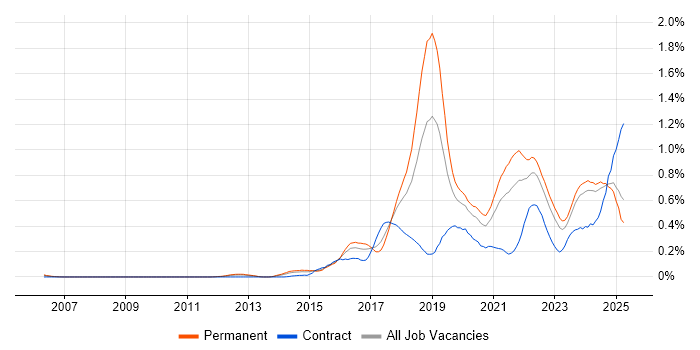IoT (Internet of Things, Internet of Everything)
England > West Midlands
The table below looks at the prevalence of the term IoT in permanent job vacancies in the West Midlands. Included is a benchmarking guide to the salaries offered in vacancies that cited IoT over the 6 months leading up to 4 March 2026, comparing them to the same period in the previous two years.
| 6 months to 4 Mar 2026 |
Same period 2025 | Same period 2024 | |
|---|---|---|---|
| Rank | 13 | 150 | 166 |
| Rank change year-on-year | +137 | +16 | +67 |
| Permanent jobs citing IoT | 930 | 44 | 53 |
| As % of all permanent jobs in the West Midlands | 14.71% | 1.20% | 0.93% |
| As % of the Miscellaneous category | 45.68% | 3.16% | 2.57% |
| Number of salaries quoted | 11 | 13 | 45 |
| 10th Percentile | £36,250 | £55,500 | £36,250 |
| 25th Percentile | £41,250 | £57,500 | £38,750 |
| Median annual salary (50th Percentile) | £42,500 | £60,000 | £57,500 |
| Median % change year-on-year | -29.17% | +4.35% | +4.55% |
| 75th Percentile | £59,270 | £63,250 | £67,500 |
| 90th Percentile | £75,000 | £80,250 | - |
| England median annual salary | £55,000 | £60,000 | £60,000 |
| % change year-on-year | -8.33% | - | -5.41% |
All Generic Skills
West Midlands
IoT falls under the General and Transferable Skills category. For comparison with the information above, the following table provides summary statistics for all permanent job vacancies requiring generic IT skills in the West Midlands.
| Permanent vacancies with a requirement for generic IT skills | 2,036 | 1,392 | 2,060 |
| As % of all permanent jobs advertised in the West Midlands | 32.20% | 37.90% | 36.31% |
| Number of salaries quoted | 716 | 619 | 1,530 |
| 10th Percentile | £26,375 | £31,250 | £26,000 |
| 25th Percentile | £32,124 | £41,250 | £35,000 |
| Median annual salary (50th Percentile) | £50,000 | £55,000 | £50,000 |
| Median % change year-on-year | -9.09% | +10.00% | -9.09% |
| 75th Percentile | £66,500 | £67,875 | £63,929 |
| 90th Percentile | £80,000 | £76,322 | £77,500 |
| England median annual salary | £55,200 | £62,500 | £55,000 |
| % change year-on-year | -11.68% | +13.64% | -15.38% |
IoT
Job Vacancy Trend in the West Midlands
Historical trend showing the proportion of permanent IT job postings citing IoT relative to all permanent IT jobs advertised in the West Midlands.

IoT
Salary Trend in the West Midlands
Salary distribution trend for jobs in the West Midlands citing IoT.

IoT
Salary Histogram in the West Midlands
Salary distribution for jobs citing IoT in the West Midlands over the 6 months to 4 March 2026.
IoT
Job Locations in the West Midlands
The table below looks at the demand and provides a guide to the median salaries quoted in IT jobs citing IoT within the West Midlands region over the 6 months to 4 March 2026. The 'Rank Change' column provides an indication of the change in demand within each location based on the same 6 month period last year.
| Location | Rank Change on Same Period Last Year |
Matching Permanent IT Job Ads |
Median Salary Past 6 Months |
Median Salary % Change on Same Period Last Year |
Live Jobs |
|---|---|---|---|---|---|
| Staffordshire | +52 | 254 | £31,500 | -25.88% | 1 |
| Warwickshire | +64 | 220 | - | - | 1 |
| Worcestershire | - | 158 | £55,000 | - | 2 |
| Birmingham | +48 | 46 | £67,264 | -13.21% | 5 |
| Shropshire | +9 | 44 | £50,000 | -13.04% | 2 |
| Wolverhampton | -3 | 15 | - | - | 1 |
| Sutton Coldfield | - | 14 | - | - | |
| Wednesbury | - | 12 | £42,500 | - | |
| Solihull | +14 | 10 | - | - | |
| Coventry | -10 | 9 | - | - | |
| Brierley Hill | - | 9 | - | - | |
| Halesowen | - | 9 | - | - | |
| Stourbridge | - | 9 | - | - | |
| Tipton | - | 9 | - | - | |
| Walsall | +11 | 8 | - | - | |
| Kingswinford | - | 8 | - | - | |
| Bilston | - | 8 | - | - | |
| Smethwick | - | 8 | - | - | |
| Dudley | - | 8 | - | - | |
| Rowley Regis | - | 7 | - | - | |
| West Bromwich | - | 7 | - | - | |
| Willenhall | - | 6 | - | - | |
| IoT England |
|||||
IoT
Co-Occurring Skills & Capabilities in the West Midlands by Category
The following tables expand on the one above by listing co-occurrences grouped by category. They cover the same employment type, locality and period, with up to 20 co-occurrences shown in each category:
